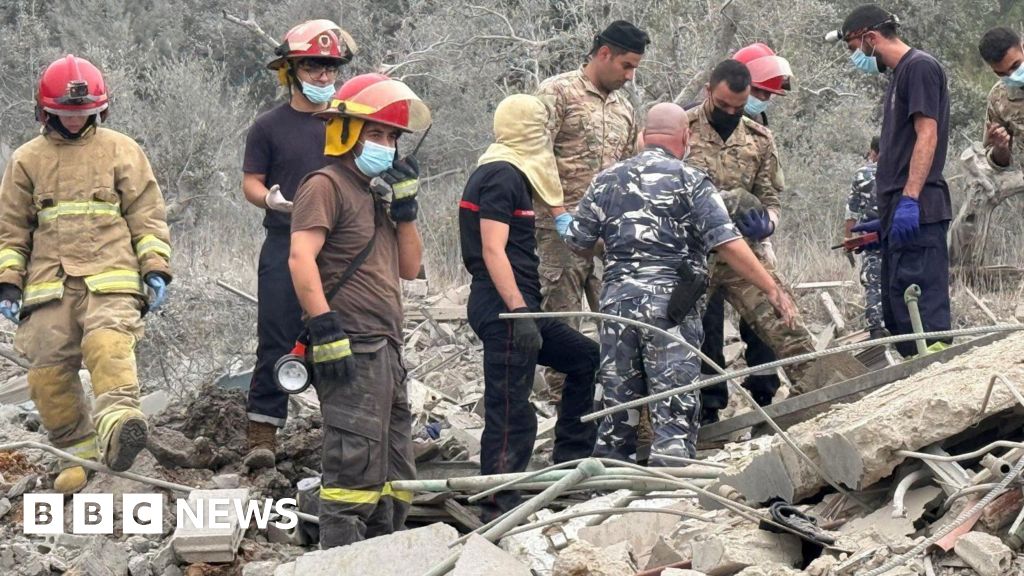UN calls for investigation into deadly Israeli strike on north Lebanese village

The UN’s humanitarian office has called for an investigation into an Israeli air strike that killed 23 people in northern Lebanon on Monday.
Spokesman Jeremy Laurence said the strike, on the Christian-majority village of Aitou, raised “real concerns” with respect to international humanitarian law.
Laurence said that 12 women and two children were understood to be among the dead from the bombing, which destroyed a residential building that had been recently rented out to a family displaced from the south.
Rescue workers were still pulling bodies from the rubble in Aitou on Tuesday – far from the focus of the conflict to date in the south of Lebanon, Beqaa Valley and parts of Beirut.
The Israel Defense Forces (IDF) is yet to comment on the strike.
Elie Alwan, the owner of the house in Aitou, told reporters that it had been rented to a family of around 10 people, who were later joined by around 10 more.
Alwan said there had been no problems with the tenants until a car came to the house on Monday – the driver apparently delivering cash – when the air strike hit.
Israeli air strikes on members of Hezbollah in the areas where the group usually operates have pushed its members to other parts of the country, creating fears across Lebanon that Israeli targets could be anywhere.
An Aitou resident, Sarkis Alwan, told the AFP news agency that the village “maybe… won’t welcome” displaced people anymore. “And villagers who have taken in displaced people, I think they will ask them to leave,” he said.
Israel has demonstrated a willingness during its recent escalation to strike residential buildings without warning as it attempts to degrade Hezbollah, which has been sporadically firing rockets into Israel for a year since the day after the Hamas attack of 7 October 2023.
On Thursday night, an Israeli strike hit a residential building in central Beirut killing 22 people, according to figures from the Lebanese health ministry.
Unconfirmed reports said that the strike, which came with no warning and wounded 117, targeted Wafiq Safa, a senior member of Hezbollah, the Iran-backed militant group that is a powerful force in Lebanon.
The reports said that the strike failed to kill him and Hezbollah has not commented on his status.
Israel says it is necessary to take on Hezbollah in order for people in the north of the country to be able to return to their homes.
A drone attack launched by Hezbollah on a military base in northern Israel killed four Israeli soldiers on Sunday and severely wounded seven more – the deadliest strike by the group since Israel launched a ground invasion of Lebanon two weeks ago.
Also on Tuesday, the UN refugee agency said that more than a quarter of Lebanon was now covered by Israeli military evacuation orders.
“People are heeding these calls to evacuate, and they’re fleeing with almost nothing,” the agency’s Middle East director Rema Jamous Imseis told a press briefing.
The evacuation orders, coupled with Israel’s ground invasion and bombing campaign, have driven a massive exodus of Lebanese people from the affected areas.
More than 1.2 million people have been displaced, according to the Lebanese government. They have fled villages and major cities in the south, and moved north to Beirut, Tripoli and other cities.
Many have ended up in unsafe and unsanitary conditions in shelters in and around the capital, where schools and shops have been closed to house people.
The sheer volume of displaced people has overwhelmed welfare services, the mayor’s office told the BBC, leaving thousands of displaced people on the streets.
Using plans made for the previous invasion, in 2006, the municipality had prepared for just 10% of the actual number of people, mayor Abdallah Darwich told the BBC last week.
“We did not imagine it could be this huge,” he said. “Every day our calculations have become larger and larger.”
The Israeli strikes on Beirut, focused on the southern suburb of Dahieh, had become a daily and nightly occurrence over the past three weeks, but the capital has not been hit for nearly five days.
Unconfirmed reports said Israeli Prime Minister Benjamin Netanyahu had suspended targeting of Beirut at the urging of the US government.
Following the Hezbollah drone strike on Sunday, Netanyahu threatened on Monday night that he would continue striking the group in Lebanon “without mercy”, including Beirut.
The deputy leader of Hezbollah, Naim Qassem, issued his own threat to Israel on Tuesday, saying the group had “a new calculation” to inflict pain on its enemy.
At the same time, Qassem, speaking in a televised address, called for a ceasefire, saying that it was the only solution to the current conflict. “If the Israelis do not want that, we will continue,” he added.
Israeli strikes have killed at least 2,309 people over the last year, according to figures from the Lebanese government, which does not distinguish between combatants and non-combatants.
Israel has said around 50 Israelis, both soldiers and civilians, have been killed.
#calls #investigation #deadly #Israeli #strike #north #Lebanese #village
News plays a pivotal role in our lives by keeping us informed and connected to the world. It serves as a critical source of information, offering updates on current events, politics, economics, science, and more. Through news, we gain awareness of global issues and local developments, helping us make informed decisions in our personal and professional lives. News also fosters discussion and debate, encouraging critical thinking and perspective-taking. Moreover, it promotes transparency and accountability among governments, businesses, and other institutions. In a rapidly changing world, staying updated with the news enables us to adapt to new challenges and opportunities, shaping our understanding of the complexities of society. Ultimately, news is not just about information; it empowers us to participate actively in the world around us, contributing to a more informed, engaged, and responsible global citizenry.
Health is fundamental to our well-being and quality of life, making it an essential aspect of daily existence. It encompasses physical, mental, and emotional aspects, influencing our ability to function effectively and enjoy life fully. Prioritizing health allows individuals to maintain optimal physical fitness, reducing the risk of diseases and promoting longevity. Mental health, equally crucial, affects our cognitive abilities, emotional stability, and overall happiness. Investing in preventive healthcare through exercise, balanced nutrition, and regular medical check-ups helps in early detection of potential health issues, ensuring timely intervention and treatment. Beyond individual benefits, a population’s health impacts societal productivity and economic stability. Governments and organizations worldwide emphasize public health initiatives to address pandemics, health disparities, and promote overall well-being. Ultimately, health serves as the foundation upon which we build our lives, influencing our ability to pursue goals, nurture relationships, and contribute meaningfully to society.
Money plays a crucial role in our lives as a means of financial security and freedom. It enables us to meet basic needs such as food, shelter, and healthcare, while also providing opportunities for education, travel, and personal growth. Beyond material comforts, money facilitates social connections and experiences that enrich our lives. It empowers individuals to invest in their futures, whether through savings, investments, or entrepreneurial ventures, thereby fostering economic stability and growth. However, the pursuit of wealth should also be balanced with ethical considerations, as money can influence relationships and societal dynamics. Responsible management of finances is key to achieving long-term goals and mitigating financial stress. Ultimately, while money is a tool for achieving aspirations and fulfilling desires, its true value lies in how it is utilized to improve both personal well-being and the broader community.
Earning Easy Money in 2024: Opportunities and Considerations 💸
In 2024, the landscape of earning easy money presents diverse opportunities, albeit with considerations. The digital age offers platforms for freelancing, online trading, and e-commerce, allowing individuals to leverage skills and creativity for financial gain. Cryptocurrency investments continue to allure with potential for quick profits, yet they entail high volatility and risk. Moreover, the rise of the gig economy enables flexible work arrangements through apps and websites, offering quick payouts but often without job security or benefits. Passive income streams such as rental properties and investments in stocks or bonds remain viable, but demand initial capital and ongoing management. Amid these options, caution is essential to avoid scams and unsustainable ventures promising overnight success. Ultimately, while the allure of easy money persists, informed decisions, diligence, and a long-term perspective are crucial for sustainable financial growth and security in the dynamic year ahead.




